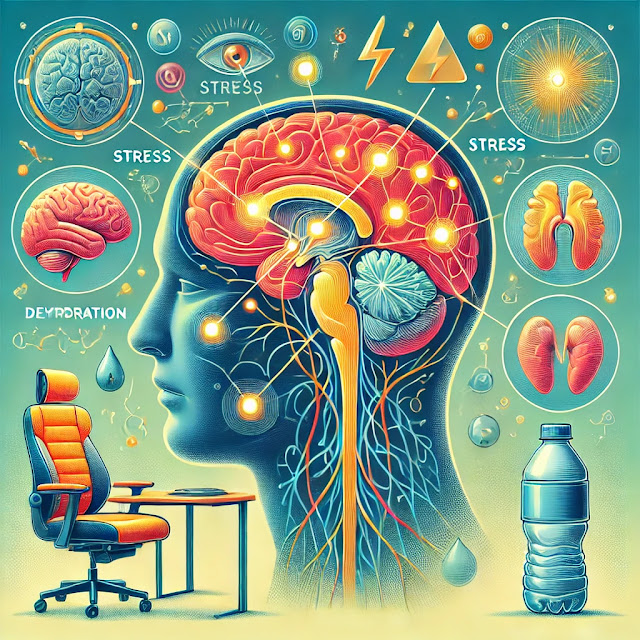The Science of Headaches: How to Prevent and Treat Them Effectively
Headaches are a universal ailment, affecting people of all ages and backgrounds. Despite their prevalence, the science behind headaches remains a mystery to many. Understanding the mechanisms of headaches can help you take control and minimize their impact on your daily life. This article delves into the causes, types, and evidence-based solutions for preventing and treating headaches effectively.
 |
| The Science of Headaches: How to Prevent and Treat Them Effectively |
1. What Causes Headaches?
Headaches occur when pain-sensitive structures in the head and neck are triggered. This can be due to various factors, such as muscle tension, changes in blood flow, nerve activation, or inflammation. External triggers like stress, dehydration, and poor posture often play a significant role in headache development.
2. Types of Headaches
There are over 150 types of headaches, but the most common include:
Tension Headaches: Characterized by a dull, aching sensation around the head. They are often triggered by stress or muscle strain.
Migraines: Intense, throbbing headaches often accompanied by nausea, sensitivity to light, and visual disturbances.
Cluster Headaches: Severe, recurring headaches on one side of the head, often around the eye.
Sinus Headaches: Caused by sinus inflammation, leading to pressure and pain around the forehead and cheeks.
3. The Role of Triggers
Identifying your personal headache triggers is crucial for prevention. Common triggers include:
Stress or emotional tension
Skipping meals or dehydration
Sleep deprivation or oversleeping
Hormonal changes
Environmental factors like bright lights or loud noises
Specific foods and beverages, such as caffeine or alcohol
4. Preventive Strategies
Prevention is the best cure when it comes to headaches. Here are some science-backed tips:
Hydration: Drink at least 8 glasses of water daily to avoid dehydration.
Regular Sleep: Maintain a consistent sleep schedule to avoid disrupting your body’s natural rhythm.
Healthy Diet: Include magnesium-rich foods like spinach and nuts, as magnesium deficiency is linked to migraines.
Stress Management: Practice mindfulness, yoga, or meditation to reduce stress levels.
Posture Awareness: Use ergonomic furniture and take breaks to stretch during prolonged sitting.
5. Treatment Options
If prevention isn’t enough, consider these treatment methods:
Over-the-Counter Pain Relievers: Medications like ibuprofen or acetaminophen can provide relief for mild headaches.
Cold or Warm Compresses: A cold pack on your forehead or a warm towel around your neck can help depending on the type of headache.
Essential Oils: Peppermint and lavender oils have been shown to relieve tension and reduce headache intensity.
Acupressure: Applying pressure to specific points like the base of your skull or between your thumb and index finger can help alleviate pain.
6. When to See a Doctor
While most headaches are harmless, some may indicate underlying health issues. Seek medical attention if you experience:
Sudden, severe headaches with no apparent cause
Headaches accompanied by fever, confusion, or vision problems
Persistent headaches that worsen over time
7. The Role of Lifestyle Changes
Long-term changes can significantly reduce headache frequency and intensity. Incorporate regular exercise, balanced nutrition, and adequate rest into your routine. Reducing screen time and practicing good eye hygiene can also prevent strain-induced headaches.
8. Debunking Myths
There are many misconceptions about headaches. For instance, not all headaches require medication, and not all headaches are caused by stress. Understanding the science behind headaches helps distinguish fact from fiction and empowers you to make informed decisions.
9. Research and Future Treatments
Advancements in neuroscience have led to new treatments for chronic headaches, such as neuromodulation devices and personalized therapies. Ongoing research continues to uncover the complex mechanisms of headaches, paving the way for innovative solutions.
10. Final Thoughts
Headaches may be common, but they don’t have to control your life. By understanding the science behind their causes and triggers, you can take proactive steps to prevent and treat them effectively. Remember, a combination of lifestyle changes, preventive strategies, and timely treatments can help you live a headache-free life. Always consult a healthcare professional for persistent or severe headaches to ensure proper care and management.
